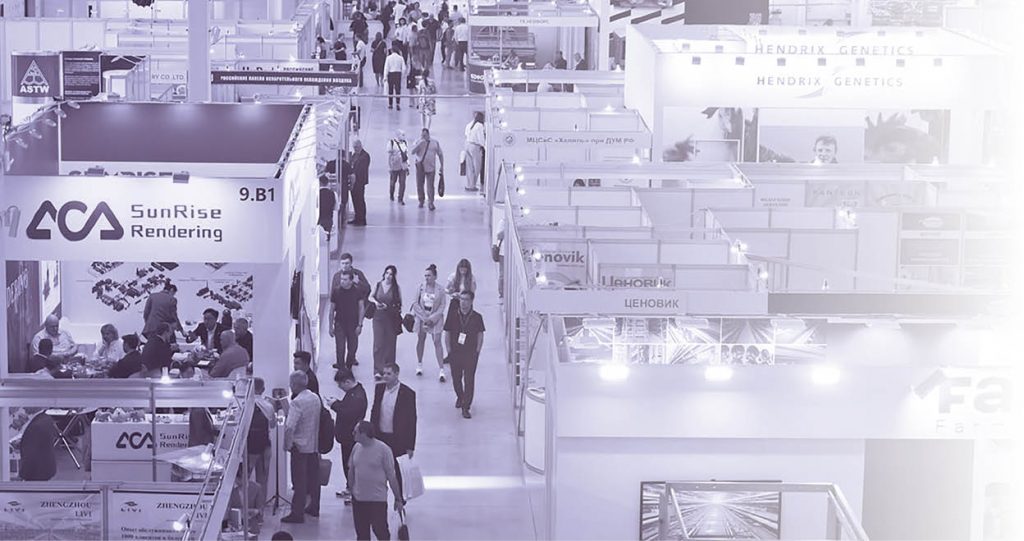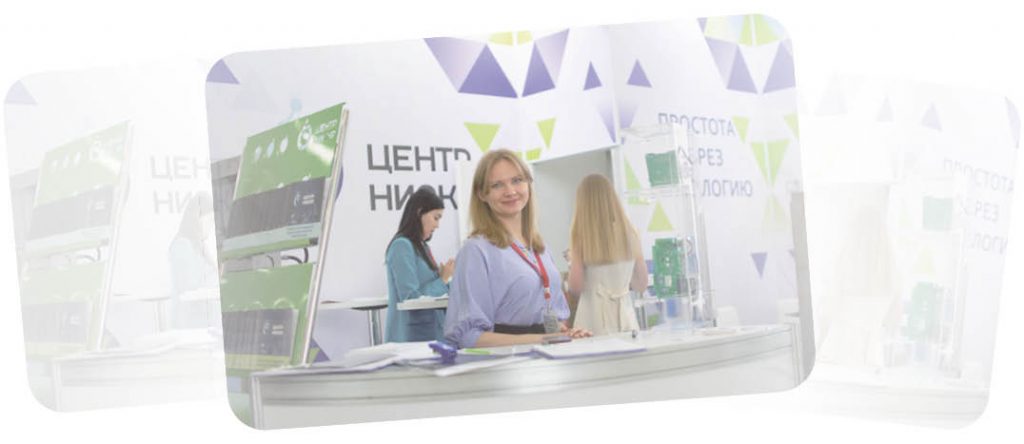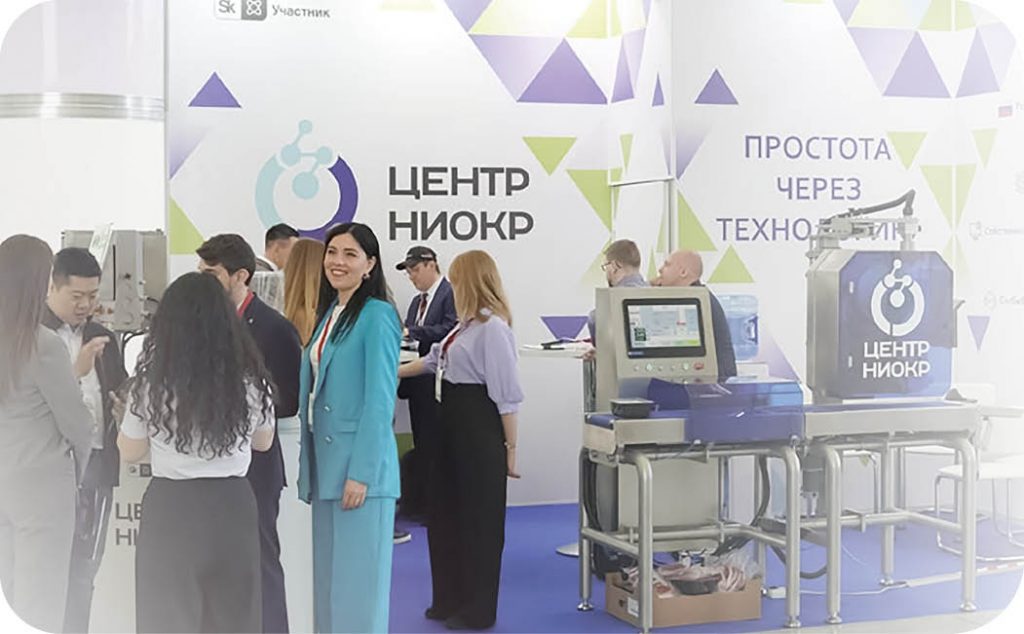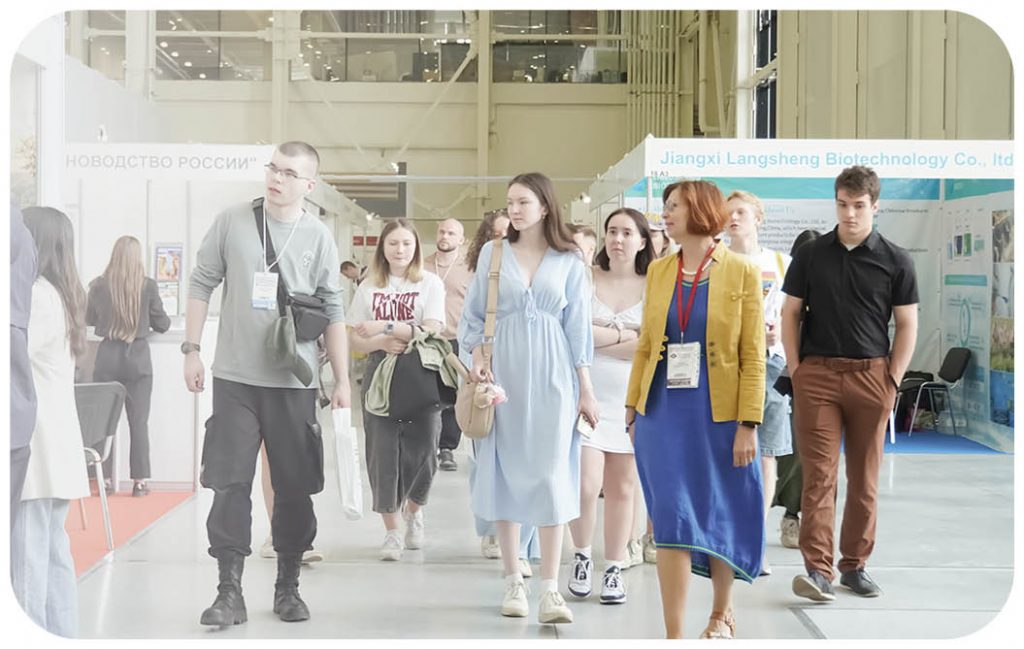Since 2001, professionals in the field of animal protein products have been learning about cutting-edge technologies and exchanging experiences at one of the largest international agricultural exhibitions in Russia, “Meat Industry. Chicken King. Refrigeration Industry for the Agro-Industrial Complex / MAP Russia”. In 2025, it brought together the best suppliers of equipment, feed, veterinary drugs, renowned experts, business and government representatives at the Timiryazev Center in Moscow.

International relations and technological innovations
Just a few years ago, entering the MAP Russia space, it was easy to imagine that you were at one of the European exhibitions: its core was made up of stands of the largest companies from Europe and other regions of the world. Times have changed, and today, looking at the exhibition, it seems that you have found yourself in one of the leading countries of Asia: a significant share of the exposition is occupied by participants from India, Iran, Kazakhstan, China, Turkey, as well as Belarus, Italy and, of course, Russia. In total, about 180 companies were presented this year, and most of them are new players for the Russian market. The organizers of MAP Russia – the company “Asti Group” – aim to introduce domestic producers of livestock and plant products to brands that can compete with the products of the departed European suppliers. At the same time, they provide comprehensive support to both exhibitors and visitors in order to establish the most effective communication: they help with product promotion, translation into Russian, and holding meetings. Several convenient areas for negotiations have been created in the exhibition space.

The exhibition fully covers the entire cycle of production and sales of products containing animal protein. In 2025, the exhibition sections included almost 200 names of categories of such products. Most of the offers were in the segments of equipment for growing and keeping animals, slaughter, processing raw materials, as well as breeding, design of buildings and structures for livestock complexes, automation of technological processes at enterprises. In addition, within the framework of the exhibition, it was possible to get acquainted with innovations in narrower areas: with equipment for cleaning air vapor from odor and for obtaining biofuels, logistics solutions, equipment for laboratories, containers and packaging, etc. This year, for the first time, companies working in the field of plant growing took part in the exhibition, and in the neighboring hall, simultaneously with MAP Russia, the exhibition “Heat and Energy 2025” was held, which gave visitors the opportunity to study new offers in the energy sector of the agro-industrial complex: over 150 companies from Belarus, Iran, China and Turkey were in the exhibition.
— Implementing the concept of “from field to table”, we traditionally turned to the applied aspects of doing business in Russia in the new realities of 2025 with their challenges and prospects, as well as in the context of the tasks set by the state. It is the focus on the full coverage of the technological cycle and the cooperation of efforts of all sectors of the country’s economy, as well as interaction with friendly organizations from other countries that will provide a powerful incentive to achieve the highest results, — said Narine Baghmanyan, President of Asti Group.
Business discussions and partnership agreements
The exhibition organizers consider an important mission to be ensuring dialogue between government agencies and the business community, therefore MAP Russia has remained one of the largest platforms for discussions and exchange of experience during large-scale business events for many years. At the summit “Agrarian Policy of Russia: Product Safety and Quality”, regularly held within the framework of the exhibition, major experts from various sub-sectors of the agro-industrial complex raise the most pressing issues of their development in the current geopolitical situation.
The plenary session of the summit was attended by the Director of the FAO Liaison Office with the Russian Federation Oleg Kobyakov, Advisor to the Head of RosAgroNadzor Vasily Lavrovsky, Deputy Head of the RosKachestvo organization Alexander Chumak and other well-known speakers. The moderator was an independent expert, Chairman of the Board of Trustees of the A. Stolypin Prize Foundation Musheg Mamikonyan. The focus was on key trends in the animal protein market, biological risks in the industry and opportunities for ensuring food security in the country.

According to FAO, global meat production in 2024 increased by 1.7% and amounted to 379 million tons in slaughter weight. Due to relatively low prices for feed and energy, the volumes of all types of meat produced increased, but the poultry sector showed a particularly large increase. Beef production is in second place. Pork volumes remained virtually unchanged, noted O. Kobyakov.
Current trends in livestock production were discussed at thematic events organized by industry associations. The National Union of Pig Breeders held a session “Innovative Technologies and Equipment for Pig Breeding”, where technology companies presented advanced solutions for the sub-sector. Under the auspices of the Russian Poultry Union, an international conference on poultry farming was held, dedicated to the 60th anniversary of the founding of industrial production of poultry meat and eggs in Russia. The event was attended by the President of the Russian Poultry Union, Academician Vladimir Fisinin, Director of the Department of Animal Husbandry and Breeding of the Ministry of Agriculture of Russia Sergey Voskresensky, General Director of the Russian Poultry Union Galina Bobyleva, Chairman of the Poultry Union “Belptitse Soyuz” Vladimir Vashkov, representatives of the largest poultry enterprises and industry organizations of Armenia, Belarus, Kazakhstan, Russia and Tajikistan, scientists and specialists of government agencies. They discussed the state of the sub-sector, the economic situation and state support for poultry farmers.
— Today, Russia ranks fourth in the world ranking for poultry production, and seventh in the production of edible eggs. In 2024, the country produced 5.4 million tons of poultry meat in slaughter weight (37.3 kg per capita). Egg production in the country reaches 46.5 billion pieces (320 pieces per capita), — noted V. Fisinin.

At the end of the conference, a ceremonial award ceremony was held for about 70 best representatives of the sub-industry.
The main topic of the panel discussion “Turkey Consumption in Russia: Growth Points” was changes in the food preferences of Russians and the formation of a new culture of turkey consumption. According to data presented by Albert Davleyev, president of the consulting company Agrifood Strategy, poultry consumption in Russia from 2025 to 2030 will grow by approximately 800 thousand tons, of which 200 thousand tons will be turkey. At the same time, pork consumption will increase by 660 thousand tons, cattle meat by 75 thousand tons, and beef consumption will decrease by 174 thousand tons.
The executive director of the National Association of Turkey Producers, Anatoly Velmatov, noted that according to the forecast, turkey production in the country will increase by 6% in 2025. By 2030, its consumption should be at least 5 kg per person per year.
Several major events were devoted to the issues of processing, storage, transportation and sale of finished products. The Association of Meat Processors and the NGO Union of Feed Producers held a joint session on increasing the efficiency of production and processing of livestock products. Issues of ensuring uninterrupted temperature conditions during storage and transportation of products, inspection and certification of refrigeration equipment, the use of digital tools and much more were discussed at the session Cold in the chain of production and movement of food products. Ensuring biosecurity and increasing the efficiency of processing poultry meat and eggs were discussed at the session organized by the Russian Poultry Union and the All-Russian Research Institute of Poultry Farming.
Much attention was paid to the development of meat exports at the summit. The business session, where promising markets for the sale of domestic products, the main risks and opportunities in cooperation with partners from various regions of the world were discussed, was moderated by Alexander Yakuba, Advisor to the Head of the Federal Center “Agroexport” of the Ministry of Agriculture of Russia.
According to the data provided, in recent years the export of meat products has been constantly growing, with poultry and pork in first place in terms of growth in supply volumes. Last year, about 800 thousand tons of meat products were exported from Russia. Among the most promising sales areas are the countries of the near abroad, Southeast Asia, the Middle East and Africa, especially Vietnam, Saudi Arabia, the UAE, Congo, Benin and Angola.
The topic of crop exports was comprehensively considered at a discussion panel within the First BRICS International Export Congress, which was moderated by Anastasia Blumina, Director of Content Programs at Savkina Expert Group. Particular attention was paid to doing business in Brazil and Vietnam. During the event, a ceremonial signing of the Memorandum of Cooperation between the Alliance of Business Structures and Entrepreneurs of Southeast Asian Countries B2BASEAN and Savkina Expert Group and Asti Group took place. In accordance with the document, it is planned to create working groups, exchange experience and implement joint projects to promote the products of companies, industry unions and associations in international markets.
The events dedicated to food safety traditionally played a primary role in the summit program. The round table, which discussed issues of product quality control, was moderated by Vasilina Gritsyuk, Deputy Director of the Federal State Budgetary Institution “VGNKI”. The event discussed the replacement of imported feed on the Russian market, ensuring the safety of livestock products, etc. The session “100 days of labeling”, moderated by Ekaterina Luchkina, Director of the Association “Association of Meat Processors”, became a platform for discussing the implementation of mandatory labeling “Honest Sign”. The company “Alliance Group” held a session “Food Safety: Current Risks in the Production of Poultry Products”.
Important topics such as staffing of the agro-industrial complex and marketing promotion of livestock products were not ignored. A session was held on “How to create a selling brand in the poultry and meat industries”, a master class on “Marketplaces – launching and scaling agro-industrial business on marketplaces”, a panel discussion on “Personnel, export and international cooperation: how educational platforms enhance the competitiveness of the Russian agro-industrial complex”, as well as the All-Russian Congress of leading HR managers of agricultural enterprises.
Despite the difficult geopolitical and economic situation and new challenges, the organizers positively assessed the results of the three exhibition days at the Timiryazev Center and intend to continue attracting the best suppliers to the Russian market. The most relevant solutions in the agro-industrial complex will be presented at the next exhibition “Meat Industry. Chicken King. Refrigeration Industry for the Agro-Industrial Complex / MAP Russia” in 2026.

